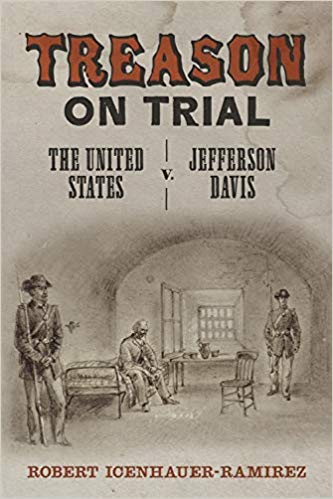Arts & Entertainment
Allen Boyer: Review of “Treason on Trial: The United States v. Jefferson Davis” by Robert Icenhauer-Ramirez
Novelists are not the only writers who deal in black humor. Sometimes it falls to historians, or legal historians, to write with verve and exasperation and irony – to narrate where great cases fell apart. In telling how Jefferson Davis escaped trial and punishment for serving as president of the Confederate States of America, Robert Icenhauer-Ramirez tells a story of delays, denials, legal conundrums, and veiled ambitions.

“Treason on Trial” cover. Photo provided.
In May 1865, as he fled south through Georgia, Jefferson Davis was captured by Union cavalrymen. Immediately, he was lodged in a military prison, but the discussion had already begun over what to do with him. Lincoln had hoped that Davis might slip away into obscurity overseas. Andrew Johnson snarled that Davis was “the head devil among the traitors, and he ought to be hung; but he ought to have a fair trial, and not be brutally treated.” Davis was not a popular man, among those whom he had led in wartime, but former rebels were alarmed that treason charges might be brought more broadly. Time did little to resolve such ambivalence.
For the government, the first issues were what to charge Davis with and where he should be tried. Early on, he was indicted for being “in league” with Confederate general Jubal Early’s wartime raid on the District of Columbia. Later, it was resolved that Davis should be tried at the site of his offense – at Richmond, Virginia. Not only was that commonwealth already a hotbed of unreconstructed nightrider activity; government lawyers doubted that any Virginia jury would convict.
The seriousness of the offense and the prominence of the defendant inhibited swift justice. A military commission tried and hanged the conspirators who had plotted with John Wilkes Booth, and another military commission tried and hanged Henry Wirz, the Confederate commander of the infamous prison camp at Andersonville – but if the leader of the Confederacy were to go on trial, it was felt, only the Chief Justice of the United States would have the prestige to preside. Chief Justice Salmon P. Chase held back from this, repeatedly, likely because he harbored hopes of running for President on the Democratic ticket. In the end, nothing did more to curtail the prosecution.

Author of “Treason on Trial,” Robert Icenhauer-Ramirez. Photo provided.
The trial work done by government lawyers was shoddy. (The initial indictment alleged that Davis had committed treason through “being moved and seduced by the instigation of the devil” – a phrase cribbed from the charges against Aaron Burr, nearly 60 years before.) Davis’s lawyers won his release from military custody and his release on bail. A November 1867 trial date passed; Chief Justice Chase wanted the case postponed until spring. By February 1868, government lawyers were marshalling arguments to set out the case against trying Davis.
It mattered little that the prosecutors had witnesses who had seen Davis wearing a gray uniform and holding himself out as President of the Confederate States. National attention turned to the impeachment of President Johnson, the attorney-general left office, and the district attorney was nominated to run for Congress. By midsummer, the Cabinet was considering a general amnesty; Davis was the single treason defendant excluded, and the Cabinet talked further. There was more courtroom skirmishing, but on Christmas Day 1868, President Johnson granted a proclamation of “universal amnesty and pardon,” covering Johnson with all other former Confederates.
Another recent study of Davis and his legal legacy, “Secession on Trial,” by Cynthia Nicoletti, delves deeply into the arguments that the prosecution and defense teams studied, including such doctrines as trial by battle, title by conquest, and belligerent status. Icenhauer-Ramirez, who both teaches legal history and practices law, draws on thirty years’ experience of criminal trials, mapping out the Davis prosecution by its deadlines, postponements, and turning points.
“The failure to bring Davis to trial did not arise from a Union concern that the results of battle would be overturned by the courts,” Icenhauer-Ramirez observes.
“By the blood drawn by the sword, secession had been rendered unconstitutional once and for all. The failure to bring him to trial did not proceed from a fear that he would be acquitted . . . . [Rather,] the convergence of constitutional hurdles, events, personalities, ambitions and [lawyers’] skills operated to deny a courtroom confrontation to those who believed Davis should be brought to trial.”
After Davis went free, Icenhauer-Ramirez concludes, Southern spokesmen felt free to argue that since he had never been on trial, his cause had been legally and constitutionally just; secession had never been unconstitutional. That claim is mistaken and pernicious. But there is another sense, a better story, in which the Confederate leader’s release plays a part. As Justice Robert Jackson wrote, the American people “have managed to do without treason prosecutions to a degree that probably would be impossible except while a people was singularly confident of external security and internal stability.”
To handle treason charges with mercy and scrupulous fairness shows the American republic’s confidence – its good conscience – in dealing with those who dissent, even on issues that are violently divisive. This is a book on which lawyers may meditate.
“Treason on Trial: The United States v. Jefferson Davis.” By Robert Icenhauer-Ramirez. Louisiana State University Press. 368 pages. $55.00.
Allen Boyer, Book Editor for HottyToddy.com, is a lawyer and writer. He is at work on a history of the law of treason.





























